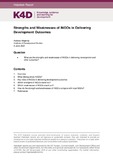| dc.contributor.author | Megersa, Kelbesa | |
| dc.coverage.spatial | Various countries | en |
| dc.date.accessioned | 2022-07-18T07:13:32Z | |
| dc.date.available | 2022-07-18T07:13:32Z | |
| dc.date.issued | 2022-06-06 | |
| dc.identifier.citation | Megersa, K. (2022). Strengths and Weaknesses of INGOs in Delivering Development Outcomes 1135 Brighton, UK: Institute of Development Studies. DOI: 10.19088/K4D.2022.090 | en |
| dc.identifier.uri | https://opendocs.ids.ac.uk/opendocs/handle/20.500.12413/17548 | |
| dc.description.abstract | Compared to smaller or local NGOs, international non-governmental organisations (INGOs) have more influence or “voice” with decision-makers, funding agencies, and policymakers. As a result, INGOs are often better positioned to impact both domestic and international policy (Kreienkamp, 2017; Cooper, 2018; Morton, n.d.).This rapid review therefore seeks to find out the strengths and weaknesses of INGOs in delivering development and other outcomes?INGOs offer local CSOs valuable capacity-building opportunities as well as exposure to a broader range of expertise and development approaches. Many local CSOs see INGOs as a well-established and important part of the development industry. They collaborate with INGOs on funding or partnership arrangements, as well as non-funding collaborative approaches like knowledge and practice networks, or policy dialogue with governments, donors, or the private sector (Morton, n.d.; Jayawickrama and McCullagh, 2009; Green, 2015). Nonetheless, despite the unique contributions made by INGOs (and their peculiar characteristics that enable them to do so), these organisations have limitations that prevent them from reaching their full potential (Green, 2017; Jayawickrama and McCullagh, 2009; Cooper, 2018; Altahir, 2013).These include accountability,difficult working environment and coordination challenges among others explained in this report.Although this rapid evidence review has identified some key strengths and weaknesses of INGOs (i.e., in relation to their development or humanitarian work), many of the important findings are linked to a few relevant reports. Overall, there is a limited evidence base on the topic – since the literature rarely provides systematic and explicit documentation of the strengths/weaknesses of INGOs. Nonetheless, there is a voluminous literature (mostly project reports) on the works of individual INGOs. | en |
| dc.description.sponsorship | Foreign, Commonwealth and Development Office (FCDO) | en |
| dc.language.iso | en | en |
| dc.publisher | Institute of Development Studies | en |
| dc.relation.ispartofseries | K4D Helpdesk;1135 | |
| dc.rights.uri | https://www.nationalarchives.gov.uk/doc/open-government-licence/version/3/ | en |
| dc.subject | Aid | en |
| dc.subject | Development Policy | en |
| dc.title | Strengths and Weaknesses of INGOs in Delivering Development Outcomes | en |
| dc.type | Helpdesk | en |
| dc.rights.holder | © Crown copyright 2022 | en |
| dc.identifier.doi | 10.19088/K4D.2022.090 | |
| dcterms.dateAccepted | 2022-06-06 | |
| rioxxterms.funder | Department for International Development, UK Government | en |
| rioxxterms.identifier.project | K4D | en |
| rioxxterms.version | VoR | en |
| rioxxterms.versionofrecord | DOI: 10.19088/K4D.2022.090 | en |
| rioxxterms.funder.project | 238a9fa4-fe4a-4380-996b-995f33607ba0 | en |

